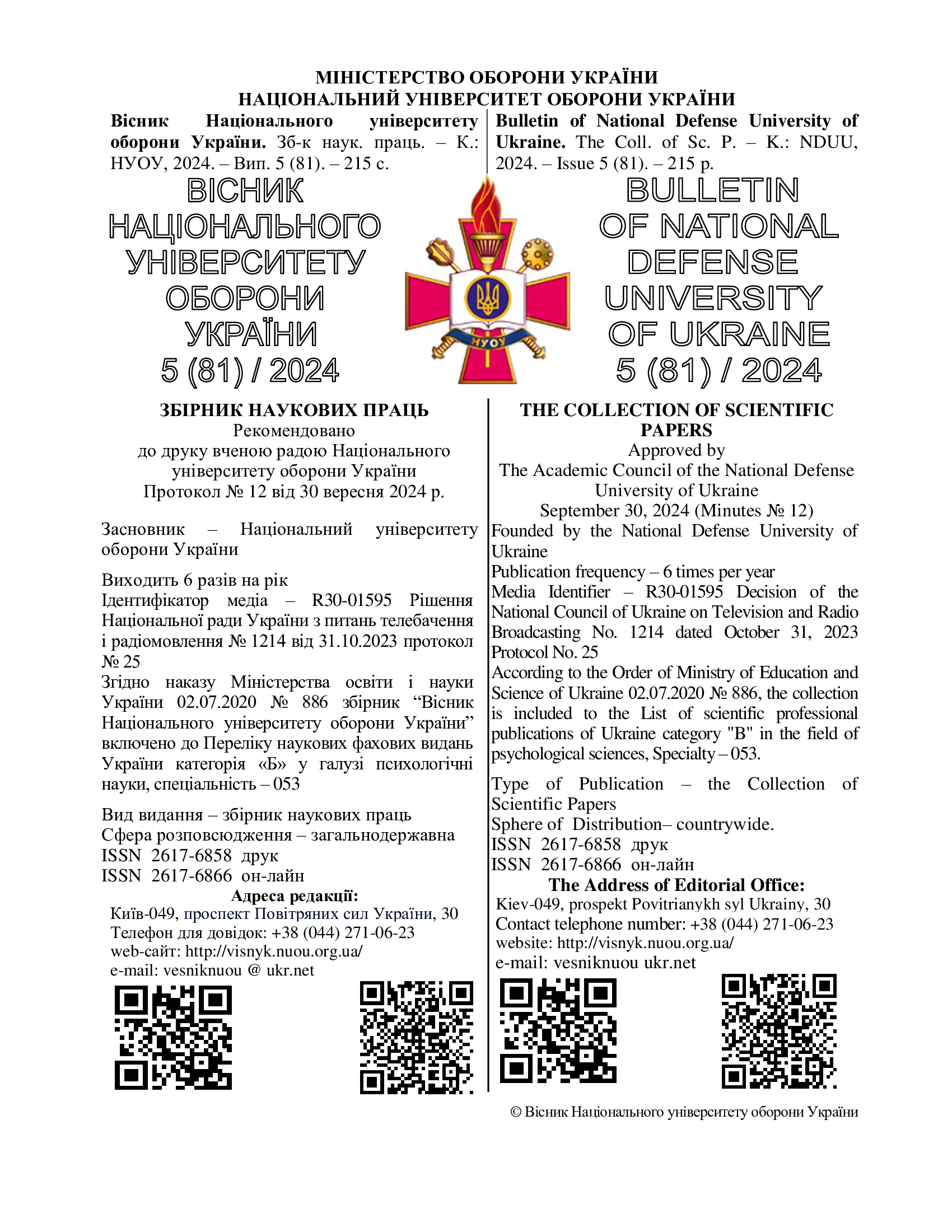ПОТЕНЦИАЛ КОГНІТИВНО-ПОВЕДІНКОВОГО ПІДХОДУ В ПСИХОТЕРАПІЇ РОЗЛАДІВ ОСОБИСТОСТІ
DOI:
https://doi.org/10.33099/2617-6858-2024-81-5-17-26Ключові слова:
розлади особистості, когнітивно-поведінкова терапія, когнітивна модель, дисфункціональні схеми.Анотація
У статті розкриваються прийоми когнітивно-поведінкового підходу у психотерапії розладів особистості. Зазначено особливості психотерапії особистих розладів, розглянуто характеристики розладів особистості та труднощі в їх лікуванні. Визначено, що в міжнародній практиці когнітивно-поведінкову терапію застосовують в психотерапії особистих розладів як науково-обґрунтований підхід, проте більшість з розладів особистості важко піддається психотерапії, потребує тривалого курсу лікування з доповненням методів з інших напрямків психотерапії.
Завантаження
Посилання
Alimoradi, Z., Jafari, E., Brostro A., Maurice, M., Ohayon, M., Lin, C., and Pakpour, A. (2022). Effects of cognitive behavioral therapy for insomnia (CBT-I) on quality of life: A systematic review and meta-analysis. Sleep medicine reviews. Retrieved from https://doi.org/10.1016/j.smrv.2022.101646
Arntz, A., Genderen, H. (2016). Thérapie des schémas et personnalité borderline. Leuvain-la-Neuve: De Boeck Supérieur.
Beck, J. S. (2005). Cognitive therapy for challenging problems: What to do when the basics don't work. New York: Guilford Press.
Beck, J. S., & Beck, A. T., (2020). Cognitive behavior therapy: Basics and beyond (3rd ed.). New York: Guilford Press.
Beck, A., Freeman, A. (1990). Cognitive therapy of personality disorders. New York: Guilford Press.
Bergeret, J. (1996). La personnalité normale et pathologique: les structures mentales, le caractère, les symptômes. Paris: Dunod.
Bonnet, A., Bréjard, V. (2012). Les troubles de la personnalité. Paris: Armand Colin.
Colby, K., Faught, W., Parkinson, R. (1979). Cognitive Therapy of Paranoid Conditions: Heuristic Suggestions Based on a Computer Simulation Model. Cognitive Therapy and Research, Vol. 3. No.1, p. 55-60.
Cottraux, J., Blackburn, I. (2006). Psychothérapies cognitives des troubles de la personnalité. Issy-les-Moulineaux: Masson.
Debray, Q., Kindynis, S., Leclère, M., Seigneurie A. (2005). Protocoles de traitement des personnalités pathologiques. Approche cognitivo-comportementale. Paris: Masson.
Farrell, J., Shaw I. (2021). Expérimentez la thérapie des schémas. Louvan-la-Neuve: De Boeck Supérieur.
Jacob, G., Arntz, A. (2021). La thérapie des schémas en pratique. Principes et outils. Leuvain-la-Neuve: De Boeck Supérieur.
Linehan, M. (1987). Dialectical behavior therapy for borderline personality disorder: Theory and method. Bulletin of the Menninger Clinic, 51(3). p. 261-276.
MacBeth, А., Schwannauer, M., Gumley, A. (2008). The association between attachment style, social mentalities, and paranoid ideation: An analogue study. Psychology and Psychotherapy: Theory, Research and Practice. The British Psychological Society. doi:10.1348/147608307X246156
Macwilliams, N. (2012). Beyond Traits: Personality as Intersubjective Themes. Journal of Personality Assessment. Retrieved from doi:10.1080/00223891.2012.711790
Martin, S. (2022). Le programme ECCCLORE. Une nouvelle approche du trouble boderline. Leuvain-la-Neuve: De Boeck Supérieur.
Medeiros, G., Grant, J. (2018) Gambling disorder and obsessive-compulsive personality disorder: A frequent but understudied comorbidity. Journal of Behavioral Addictions 7(2), Retrieved from doi: 10.1556/2006.7.2018.50
Pilyagina, G., Chumak, S. (2014). Predicative factors of recurrence process of the self-destructive factors of recurrence process of the self-destructive behaviour. Shupyk National Medical Academy of Postgraduate Education. Retrieved from https://www.researchgate.net/publication/299407651
Rees, C., Pritchard, R. (2013). Brief Cognitive Therapy for Avoidant Personality Disorder. American Psychological Association Vol. 52, No. 1. Retrieved from doi: 10.1037/a0035158
Rusinek, S. (2006). Soigner les schémas de pensée. Une approche de la restructuration cognitive. Paris: Dunod.
Taylor, C., Bee, P., Haddock, G. (2016). Does schema therapy change schemas and symptoms? A systematic review across mental health disorders. Psychol Psychother. 90 (3) p.456-479 Retrieved from doi: 10.1111/papt.12112
Tisseyre, M., Hudon, A., Giguère C., Vallières A., Bastien C., Bérubé F., Cailho, L. (2022). Insomnia and suicide risk in cluster B personality disorder: A comparative cross-sectional study. Santé mentale au Québec, Volume 47, numéro 2, p. 113–139 Retreived from https://doi.org/10.7202/1098897ar
Young, J., Klosko, J., Weishaar M. (2017). La thérapie des schémas. Approche cognitive des troubles de la personnalité (2e éd.) Leuvain-la-Neuve: De Boeck Supérieur.
##submission.downloads##
Опубліковано
Як цитувати
Номер
Розділ
Ліцензія
Авторське право (c) 2024 Вісник Національного університету оборони України

Ця робота ліцензується відповідно до Creative Commons Attribution-NonCommercial-ShareAlike 4.0 International License.





